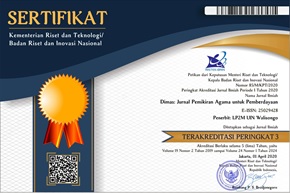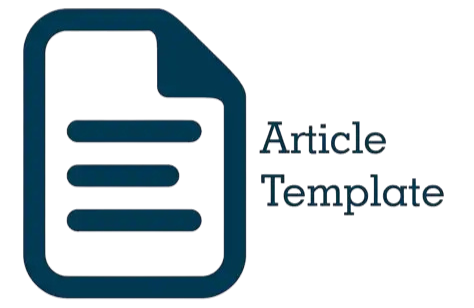Knowledge Enhancement Among Members of the Women Farmers Group (WFG) through Islamic Science-Based Soil Ecology Education
DOI:
https://doi.org/10.21580/dms.2023.232.18554Keywords:
Empowerment, Farming Women's Group, Islamic Science, Organic Agriculture, Soil EcologyAbstract
Farmers' knowledge about soil ecology, which is a key factor in increasing the productivity of agricultural products, needs to be evaluated considering that various counseling efforts to increase agricultural yields have not shown satisfactory results. Farmers still unequally manage farmland, providing excessive chemical fertilizers without regard to soil ecology. The purpose of this education is to evaluate the knowledge of the Women's Farmers Group (WFG) before and after conducting soil ecology education based on Islamic science. The subjects of this education were 15 members of WFG Bunga Padi, Jorong Kawai, Nagari Batu Bulek, Lintau Buo Utara, Tanah Datar, West Sumatra, Indonesia. The community-based research (CBR) approach is used in this educational activity. The stages of educational activities start from socialization, laying the basis of the research and the research design, providing pretests and materials, gathering information and analyzing data on biological factors, capillarity of groundwater, water holding capacity, soil aeration, soil fertility, and soil pH, and the evaluation (post-test). The results show an increase in knowledge and understanding among WFG Bunga Padi members after Islamic science-based soil ecology education. It is hoped that, over time, their mindset in managing farmland will be balanced, with less reliance on chemical fertilizers and more emphasis on soil ecology. As a result, Islamic science-based soil ecology education could have a role in improving farmland and laying the foundation for organic farming.
Downloads
References
Bhardwaj, Deepak, Mohammad W. Ansari, Ranjan K. Sahoo, and Narendra Tuteja. 2014. “Biofertilizers Function as Key Player in Sustainable Agriculture by Improving Soil Fertility, Plant Tolerance and Crop Productivity.” Microbial Cell Factories 13, no. 1: 1–10. https://doi.org/10.1186/1475-2859-13-66.
Braito, Michael, Heidi Leonhardt, Marianne Penker, Elisabeth Schauppenlehner-Kloyber, Georg Thaler, and Courtney G. Flint. 2020. “The Plurality of Farmers’ Views on Soil Management Calls for a Policy Mix.” Land Use Policy 99, no. June: 104876. https://doi.org/10.1016/j.landusepol.2020.104876.
Dessart, François J., Jesús Barreiro-Hurlé, and René Van Bavel. 2019. “Behavioural Factors Affecting the Adoption of Sustainable Farming Practices: A Policy-Oriented Review.” European Review of Agricultural Economics 46, no. 3: 417–71. https://doi.org/10.1093/erae/jbz019.
Fadhilah, Muhammad Luthfie, Bambang Trisetyo Eddy, and Siwi Gayatri. 2018. “Pengaruh Tingkat Pengetahuan, Sikap Dan Keterampilan Penerapan Sistem Agribisnis Terhadap Produksi Pada Petani Padi Di Kecamatan Cimanggu Kabupaten Cilacap.” Agrisocionomics: Jurnal Sosial Ekonomi Pertanian 2, no. 1: 39. https://doi.org/10.14710/agrisocionomics.v2i1.1327.
Fahrizal, Muhammad Habib, Robiatul Usluhiyah, and Abd Kholid. 2021. “Peningkatan Keterampilan Petani Melalui Workshop Petani Organik.” Pertanian: Jurnal Pengabdian Masyarakat 2, no. 1: 1–4.
Foth, HD. 1990. Fundamental of Soil Science. 8th ed. New York: John wiley & Sons.
Gusti, Irganov Maghfiroh, Siwi Gayatri, and Agus Subhan Prasetyo. 2022. “The Affecting of Farmer Ages, Level of Education and Farm Experience of the Farming Knowledge about Kartu Tani Beneficial and Method of Use in Parakan Distric, Temanggung Regency.” Jurnal Litbang Provinsi Jawa Tengah 19, no. 2: 209–21. https://doi.org/10.36762/jurnaljateng.v19i2.926.
Hadiyanti, Nugraheni, Devina Cinantya Anindita, and Adam Mahardika. 2022. “Pemberdayaan Masyarakat Desa Wonorejo, Kec. Pagerwojo, Kabupaten Tulung Agung Menuju Masyarakat Desa Ekologi.” JATIMAS : Jurnal Pertanian Dan Pengabdian Masyarakat 2, no. 1: 10. https://doi.org/10.30737/jatimas.v2i1.2556.
Konawe, D I Kabupaten. 2022. “Peran Penyuluh Pertanian Pada Program Upsus.” Sibatik Journal 1, no. 4: 441–52.
Laisshram. J, Saxena, KG, Maikhuri, RK and Rao, KS. 2015. “Soil Quality and Soil Health : A Review.” International Journal of Ecology and Environmental Sciences 38, no. JANUARY 2012: 19–37.
Mozumdar. L. 2012. “Agricultural Productivity and Food Security in the Developing Word.” Bangladesh J. Agric. Econs. xxxv, no. 2: 53–69.
Mustafa, Muslimin, Asmita Ahmad, Muh Ansar, and Masyhur Syafiuddin. 2012. Dasar Dasar Ilmu Tanah. Makasar: Unhas Press.
Oktavia, HF, Susilastuti , D, Aditiameri, Husin, M, obing, SML, Rahmayanti, FD. 2020. “Pemberdayaan Petani Dalam Mengurangi Residu Melalui Pertanian Ramah Lingkungan Di BPP Tambun Utara, Kabupaten Bekasi.” Abdi Wiralodra : Jurnal Pengabdian Kepada Masyarakat 2, no. 1: 27–38. https://doi.org/10.31943/abdi.v2i1.21.
Pratiwi, Efrita Riadiani, and Sudrajat. 2012. “Perilaku Petani Dalam Mengelola Lahan Pertanian Di Kawasan Rawan Bencana Longsor.” Jurnal Bumi Indonesia 1, no. 3: 355–62.
Puu, Yustina Maria Silvia Wonga, Agustinus J.P. Ana Saga, Baltasar Taruma Djata, and Charly Mutiara. 2019. “Pemberdayaan Masyarakat Petani Dalam Pengelolaan Pupuk Dan Pestisida Organik Dari Tanaman Lokal Di Desa Wolofeo Kecamatan Detusoko Kabupaten Ende.” PRIMA: Journal of Community Empowering and Services 3, no. 2: 43. https://doi.org/10.20961/prima.v3i2.39203.
Ramadhana, Yanuar Dwi Firdaus, and Sri Subekti. 2021. “Pemanfaatan Metode Penyuluhan Pertanian Oleh Petani Cabai Merah Utilization of Agricultural Explanation Methods by Red Chilli Farmers Penyuluhan Pertanian Dan Penerapan Inovasi Bagi Kegiatan Pertanian Selalu Digencarkan Dengan Program Yang Mampu Merubah S.” KIRANA: Jurnal Komunikasi Dan Penyuluhan Pertanian 2, no. 2: 113–33.
Reganold, John P., and Jonathan M. Wachter. 2016. “Organic Agriculture in the Twenty-First Century.” Nature Plants 2, no. 2: 1–8. https://doi.org/10.1038/NPLANTS.2015.221.
Reimer, A., J. E. Doll, T. J. Boring, and T. Zimnicki. 2023. “Scaling up Conservation Agriculture: An Exploration of Challenges and Opportunities through a Stakeholder Engagement Process.” Journal of Environmental Quality 52, no. 3: 465–75. https://doi.org/10.1002/jeq2.20317.
Rezaei-Moghaddam, Kurosh, Nasim Vatankhah, and Abdolazim Ajili. 2020. “Adoption of Pro-Environmental Behaviors among Farmers: Application of Value–Belief–Norm Theory.” Chemical and Biological Technologies in Agriculture 7, no. 1: 1–15. https://doi.org/10.1186/s40538-019-0174-z.
Saad Sultan, Abo El – Qassem. 2021. “Future Prospects for Sustainable Agricultural Development.” International Journal of Modern Agriculture and Environment 1, no. 2: 54–82. https://doi.org/10.21608/ijmae.2023.215952.1012.
Supriyadi, Purwanto, Hartati S, Mashitoh, G, Nufus, M , Aryani, W. 2021. “Pelatihan Dan ToT Ekologi Tanah Untuk Penguatan Pertanian Organik Pada Soil Ecology Training and ToT for Strengthening Organic Agriculture in Al- Barokah and Walisongo Farmer Groups in Ketapang Village.” PRIMA: Journal of Community Empowering and Services 5, no. 2: 127–34.
Wahyuni, Riska, Rahmad Sudibyo, and Nur Amir. 2021. “Faktor-Faktor Yang Berperan Terhadap Tingkat Partisipasi Petani Dalam Budidaya Tanaman Organik Di Kecamatan Junrejo Kota Batu.” Jurnal Ekonomi Pertanian Dan Agribisnis 5, no. 2: 544–60. https://doi.org/10.21776/ub.jepa.2021.005.02.22.
Widowati, Widowati, Agnes Quartina Pudjiastuti, and Ana Arifatus Sa’diyah. 2020. “Introduksi Teknologi Biochar Untuk Memperbaiki Lahan Kritis Milik Petani Wilayah Magersari Di Kabupaten Tuban, Propinsi Jawa Timur.” Jurnal Pengabdian Kepada Masyarakat 26, no. 3: 124. https://doi.org/10.24114/jpkm.v26i3.17625.
Yuliana, Euis Dewi. 2020. Ajeg Subak Dalam Transformasi Pertanian Modern Ke Organik. Bali: UNHI Press.
Zeynab, Jouzi, Azadi Hossein, Taheri Fatemeh, Zarafshani Kiumars, and Van Passel Steven. 2017. “Organic Farming and Small-Scale Farmers : Main Opportunities and Challenges.” Ecological Economics 132: 144–54.
Downloads
Published
Issue
Section
License
Copyright
The copyright of the received article shall be assigned to the journal as the publisher of the journal. The intended copyright includes the right to publish the article in various forms (including reprints). The journal maintains the publishing rights to the published articles. Therefore, the author must submit a statement of the Copyright Transfer Agreement.*)
Licensing

This work is licensed under a Creative Commons Attribution-ShareAlike 4.0 International License.
In line with the license, authors are allowed to share and adapt the material. In addition, the material must be given appropriate credit, provided with a link to the license, and indicated if changes were made. If authors remix, transform or build upon the material, authors must distribute their contributions under the same license as the original.
_______
*) Authors whose articles are accepted for publication will receive confirmation via email and send a Copyright Transfer Agreement.









